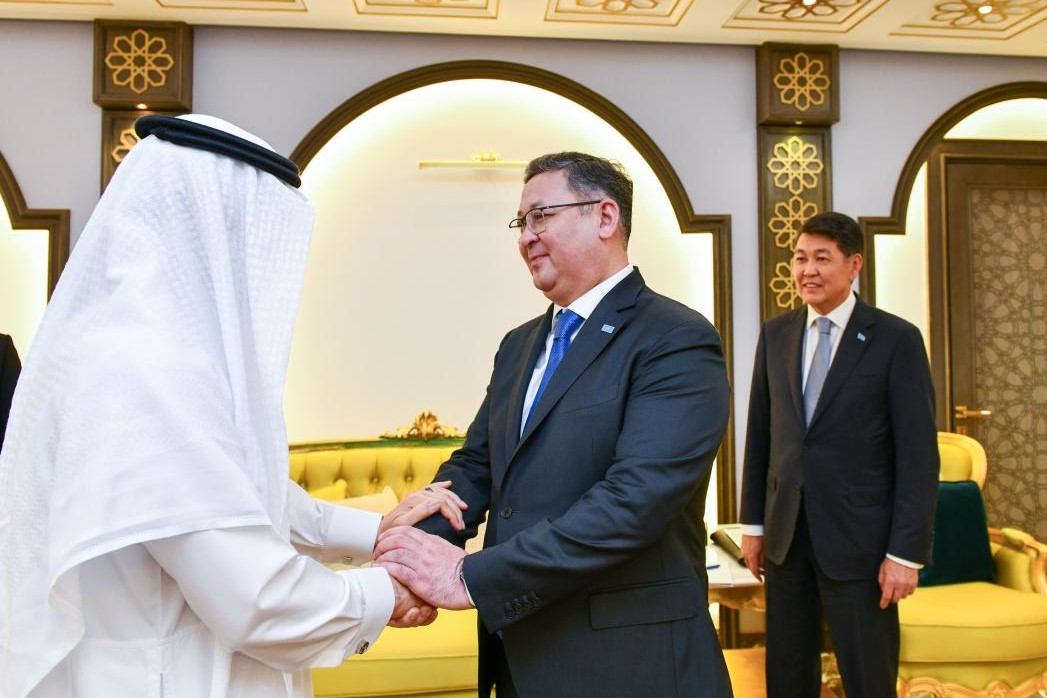This past week, the media paid attention to the meeting between Kazakhstan’s government and the leadership of the Islamic Development Bank, where a package of 70 development projects totaling $1.6 billion was announced, Kazakhstan’s shift to a single time zone, Kazakhstan and Uzbekistan trying to enhance their bilateral relations during a visit of their heads of government, Japan announcing an investment package of US$12 million into Kyrgyzstan to support the construction of modernized irrigation projects, and the U.S. and the Taliban accusing each other of violating the terms of the Doha Agreement that formalized the U.S. withdrawal from Afghanistan.

Kazakhstan’s Deputy Prime Minister – Minister of Foreign Affairs Murat Nurtleu meets with the President of the Islamic Development Bank. Source: MFA
During a meeting in Riyadh, Saudi Arabia, the President of the Islamic Development Bank (IDB), Muhammad Sulaiman Al Jasser, met with Kazakhstan’s Foreign Minister and Deputy Prime Minister to announce a new investment package on the sidelines of the Council of Foreign Ministers of the Organization of Islamic Cooperation meeting (Astana Times). The list of specific projects has not been released, but they will constitute “socio-economic” development projects totaling $1.6 billion. During the meeting, the Bank’s President expressed his interest in cooperating further with Kazakhstan, pointing out the country’s economic potential, and stated that the Bank will propose further projects and reveal the scope of the projects announced in Riyadh in the near future (Kaz Inform).
On March 1, cities across the east of Kazakhstan switched to a single time zone, UTC+5, bringing the time back one hour in the eastern two-thirds of the country. The decision came following recommendations by a committee of government officials and scientists to align the country to a “more natural” time zone. Government officials recommended that Kazakhstanis attempt to adhere to their regular routines to mitigate against the stress of the time change. Government institutions, railways and other national providers changed the time promptly to reflect this change (Astana Times). The cities of Almaty, Astana, and Shymkent and the provinces of Akmola, Almaty, Zhetysu, Zhambyl, Kostanai, Karaganda, Pavlodar, North Kazakhstan, Turkistan, East Kazakhstan and Ulytau were affected by this time change (Newsline Kazakhstan).
Kazakhstan’s Prime Minister Olzhas Bektenov will meet with his Uzbekistani counterpart, Abdulla Aripov, to discuss issues of trade, agricultural cooperation, investment, and logistics this week. Prior to the meeting, Kazakhstan’s parliament ratified the Treaty of Allied Relations between both countries, upgrading their strategic relationship. The treaty states that both sides will refrain from joining allied blocs that would threaten the interests of the other party, as well as enable them to better cooperate on shared water resources and transboundary water resources (Astana Times). The meeting will seek to formalize the terms of the treaty and operationalize some of the methods for cooperation between the two states (Uzbekistan Daily).
The First Deputy Minister of Water Resources, Agriculture and Processing Industry of Kyrgyzstan Murat Ramatov announced to a meeting of parliament that Japan will provide a significant series of investment projects to upgrade Kyrgyzstan’s irrigation systems countrywide. The package of irrigation projects totals $12 million (6.6 billion Kyrgyz Som) and is divided into a package to repair and maintain current irrigation projects and to purchase special equipment to modernize the country’s irrigation infrastructure (24.Kg). The investment will build over 2,000 kilometers of irrigation ditches across the country, 2,700 hydraulic mechanisms and 315 pumping stations and the construction of a new drainage canal in the Chon-Alai district of the country (24.kg). At a concurrent meeting in Tokyo with Japan’s Director of the Department for Russia, Central Asia and the Caucasus at the Ministry of Economy, Trade and Industry, Kyrgyzstan’s Ambassador to Japan, Erkinbek Osoev, laid out terms of agreement for a package of hydroelectric projects across Kyrgyzstan. Representatives from the meeting announced that the details will be made public in the coming weeks (AKI Press).
Four years after the U.S. withdrawal from Afghanistan, both the American side and the Taliban are accusing each other of violating the terms of the Doha Agreement that negotiated the American exit from the country following two decades of conflict. U.S. State Department spokesman Matthew Miller stated that the Agreement, from its outset, weakened U.S. partners in the government of Afghanistan and did not provide an adequate exit plan once U.S. soldiers left the country. He further stated that the Taliban had not held up its end of the agreement and was actively harboring terrorists, nor had entered into a dialogue with the previous government to transfer power according to the Agreement (Pajhwok). From the Taliban side, Anas Haqqani, a senior member of the government, stated that the U.S. had not followed through on its commitment to remove Afghanistan from an international UN sanctions list and trade blacklist. He called on the international community to right this and enter into peaceful and mutually beneficial relations with the Taliban government (Tolo News).

